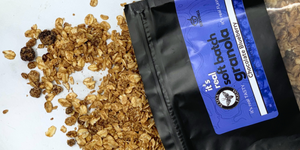Are Sprouted Oats Better For You?
YES! Sprouted oats are more nutritious and easier to digest than unsprouted oats. We chose to source organic, gluten-free oats because we wanted our Soft-Batch Granolas to be nutrient dense and digestible to deliver the best health benefits we can offer!
What Are The Benefits of Sprouting Oats?
- Decreases the starches
- Reduces allergenicity
- Increases amount of enzymes, essential amino acids (especially GABA), and B-vitamins
- Makes much of the nutrition in the oat more bioavailable
- Increases protein and insoluble fiber
- Increases magnesium
- Increases antioxidants
- Increases nutrient absorption of other foods consumed at the same time
- Lowers the glycemic index
- Increases digestibility
- Decreases inflammatory antinutrients
What Does “Sprouted” Really Mean?
Have you heard about sourdough? Yeah… unless you’re living under a rock, sourdough is pretty much all anyone can talk about. And, it’s cool- sourdough is delicious… but it isn’t the ONLY way to make grains healthier to eat.
Unfortunately, sourdough seems like a faraway dream goal for many very busy people… so instead of making their own, they either buy from others… or… they simply never benefit from proper grain preparation.
Let me say that another way- The vast majority of people reading about sourdough think it’s the only way to eating grains and staying healthy. What a shame! Most of these people don’t realize that sourdough ISN’T THE ONLY WAY!!
Soaking and sprouting achieve the same goals!!
Why Sprout, Sour or Soak?
Every seed on the planet is born of a plant that has one goal- perpetuation of the species. Because survival is so important, any seed has a built-in protection system called the seed coat. Here in my climate in the Midwest, the seed coat is really important for winter survival. Inside the “coat” the baby plant and all the nutrition it needs to put down roots and reach for the sun initially are carefully packed away. If the plant were to try to sprout in the dead of winter, it wouldn’t live out the day. The seed coat only opens up to let the baby plant out under the right conditions. Those conditions are warmth, moisture and slightly acidic environment.
For the plant, the seed coat is an insurance policy. Not only does it protect from germination at the right time, but it can also discourage herbivores from eating too many babies…. Without a negative consequence, a seed eating organism might eat every last baby a plant drops in one meal! The seed coat needs to be bitter, or cause digestive upset, or outright poison its predators because the seed has no other means of self-defense.
So what does that mean to us? Basically, if we eat the seed without deactivating the defense system we won’t access all the nutrition inside and we will likely have a negative consequence from a digestive standpoint.
But WAIT! You might be saying…. Isn’t the amount of nutrition inside the seed the same, regardless of whether or not the seed coat is active? Yes and no. If you take the seed to a lab and analyze it’s ashes, the chemical composition will read the same, regardless of whether or not the seed coat is active. But the lab report in this instance does not tell you what is available to absorb!
Eating a seed with its seed coat intact is like packing a gloriously nutritious salad into a plastic storage container, sealing it up tight….. and then eating the container!
If you take the container to the lab and burn it up to analyze its ashes, you’ll see all manner of vitamins and minerals…. But back in the reality of your gut- you get nada! Your digestion can’t get through the plastic container in time before it passes on, unopened into your lower intestines and on out of your body as waste. In the process, your digestive organs were throwing themselves at the outside walls of the plastic… and creating a fair bit of inflammation in the process.
When we soak, sprout or sour our grains, nuts and seeds, we gain access to the nutrition inside the seed and it becomes bioavailable for our absorption and use.
Are Sprouted Oats Anti-inflammatory?
Yes! The seed coat I mentioned above is not only keeping all the nutrition in… it has that a defense mechanism on the outside. The body’s constant struggle against the seed coat is one way that we see inflammation in the digestion tract. The second inflammatory reaction we get here is really due to malnutrition.
The seed coat of most plants is laced with a variety of what are termed “anti-nutrients”. The big one we see with grains is called phytic acid- which is actually an antioxidant. Small amounts of phytic acid can actually be beneficial for us… but in large amounts it is not only inflammatory, it blocks your ability to absorb the nutrients in other foods you are eating at the same time. Specifically, repeated ingestion of phytic acid reduces your absorption of iron, zinc, calcium and manganese in the nutritious foods you’ve combined with improperly prepared grains.
Are Sprouted Oats Gluten Free?
Yes. Truthfully, all oats are gluten-free, but care must be taken in sourcing your oats from places that do not process them on the same equipment as gluten-filled grains. The sprouted oats we use are certified gluten-free and are taking care to keep their processing separate.
Benefits of Oats
Oats have started to get a bad reputation… and by extension so is granola! We LOVE granola and hate to see people throw out the baby with the bath water, so we decided to offer something different.
Once upon a time, oats were celebrated as one of the healthiest foods you could eat. Now the average health-conscious person steers clear of oats because of their glycemic index and stomach irritation. We believe it’s all a misunderstanding- When the oat is properly prepared, you get all the health benefits and none of the tummy trouble of unsprouted oats!
A few good words about the health potential of oats:
- All parts of the plant are used in traditional health therapies to support nervous system health
- They are a good source of fiber (especially beta glucan-believed to be the main reason oats can lower cholesterol)
- The only food source of avenanthramides (antioxidants that are especially helpful for heart health)
- Also contain the antioxidant ferulic acid (anti-inflammatory and boosts the effects of other antioxidants like vitamin E, C and A)
- Studies have shown oats can lower blood sugar and cholesterol levels
- High in manganese, phosphorus, copper, vitamin B1, iron, selenium, magnesium, zinc
- A good source of vitamin E

